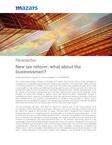
New tax reform: what about the businessman?
The Government stated, through its Minister of Finance, that the tax reform to be submitted to Congress for consideration would have the following main themes: 1) to extend the validity of the tax on financial movements (4x1000), tax through which $5.8 billion are collected annually, 2) to create a new wealth tax, tax whose last installment is being paid this year and through which $4.4 billion are collected annually, 3) to tax the assets of Colombians abroad that have not been declared and, 3) tax the assets of Colombians abroad that have not been declared and, concurrently, generate a new amnesty for those who decide to declare them (this would be done, supposedly, through a constitutional reform, since the Constitutional Court has declared all previous amnesties that have been established for this purpose unconstitutional for violation of the principle of equity), and 4) establish criminal penalties for evasion. This last proposal has been overturned in the last tax reforms due to the inconvenience of its incorporation into the Colombian legal system.
The last proposal has been shot down in recent tax reforms due to the inconvenience of its incorporation into the Colombian legal system. Moreover, it is not only necessary that the forthcoming tax reform be based on the principle of equity, but also that it recognize the company as the fundamental engine of a market economy, and advocate for its protection and preservation. To this end, the new tax reform should include stipulations that: 1) Allow tax consolidation in business groups, since in Colombia the regulation of business groups only contains provisions that are adverse to the interests of businessmen and none that benefit them. In all "civilized" economies, there is a tax consolidation regime for business groups through which they can choose to be taxed on the net result of their operation and not taxed for each of the companies that make it up, as if they were watertight compartments, 2) Maintain the "Status Quo" in the matter of taxation of dividends; 2) Maintain the "Status Quo" in terms of taxation of dividends; the current regulations avoid double taxation in this type of income (because if the profit is taxed in the company, it is not taxed in the head of the shareholder) and allows Colombia to continue being an interesting jurisdiction for the incorporation of Holding companies in Latin America, 3) Generate benefits and incentives for industrialization and hiring of new personnel; the Colombian company, to develop properly, needs serious tax incentives as it was at the time the special deduction for investment in real productive fixed assets.
It is essential that the businessman feels that the tax reform not only increases his tax burden, but also generates new opportunities to grow in a market economy.


